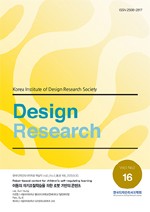- 영문명
- An Exploratory Study on Emotion-Centered Voice User Interface(VUI) Design for Generation Z Single-Person Households : Focusing on Siri
- 발행기관
- 한국디자인리서치학회
- 저자명
- 오지위(Zhi Wei Wu) 송민정(Min jeong Song)
- 간행물 정보
- 『한국디자인리서치』Vol10, No. 3(통권 36권), 234~247쪽, 전체 14쪽
- 주제분류
- 예술체육 > 미술
- 파일형태
- 발행일자
- 2025.09.30

국문 초록
본 연구는 음성 사용자 인터페이스(VUI)의 일상화 속에서 Z세대 20대 1인 가구 사용자의 감성적 요구에 주목하여, 음성 인식 AI 비서의 정서적 경험 최적화 방안을 탐색하였다. 연구는 사용자 조사, 사례 분석, 프로토타입 설계 및 사용성 테스트, 감정 인식 기술 분석의 4단계로 진행되었으며, P-A-T 모델을 적용해 감성 기반 VUI 설계 전략을 도출하였다. UI는 시각적 피드백, UX는 대화의 자연스러움·감정 대응·상황 적응성을 중점으로 고려하였다. 사용성 테스트 결과, 사용자들은 인격화된 대화와 감정적 반응을 핵심 만족 요인으로 인식했으며, 시각적 피드백이 몰입 경험을 강화함을 확인하였다. 본 연구는 AI 비서를 정보 전달자를 넘어 정서적 디지털 동반자로 발전시킬 수 있는 가능성과, 향후 개인화된 VUI 설계를 위한 방법론적 기초를 제시한다.
영문 초록
This study explores strategies to optimize the emotional experience of voice user interfaces (VUIs) in AI assistants, focusing on Generation Z single households in their 20s. The research proceeded in four stages: user survey, case analysis, prototype design with usability testing, and emotion recognition technology analysis, applying the Person–Artifact–Task (P-A-T) model to derive emotion-based VUI design strategies. In UI, visual feedback elements were emphasized, while in UX, conversational naturalness, emotional responsiveness, and adaptability to user states were considered. Usability testing revealed that users perceived personalized dialogue and emotional reactions as key satisfaction factors, with visual feedback enhancing immersion and emotional engagement. These findings suggest that AI assistants can evolve beyond functional tools into emotionally connected digital companions, and the study provides methodological foundations for future personalized VUI design.
목차
1. 서론
2. 이론적 배경
3. 스마트폰 음성 인식 AI 비서 사례
4. 스마트폰 음성 인식 AI 비서 사용자 분석
5. 음성 사용자 인터페이스 시나리오 별 시뮬레이션 분석
6. 음성 사용자 인터페이스 디자인 설계
7. 결론
참고문헌
키워드
해당간행물 수록 논문
참고문헌
최근 이용한 논문
교보eBook 첫 방문을 환영 합니다!

신규가입 혜택 지급이 완료 되었습니다.
바로 사용 가능한 교보e캐시 1,000원 (유효기간 7일)
지금 바로 교보eBook의 다양한 콘텐츠를 이용해 보세요!



